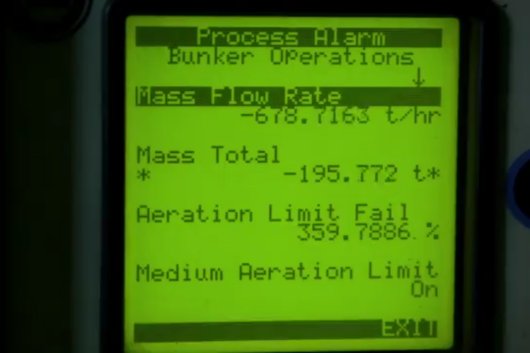ExxonMobil to launch Singapore MFM deliveries for MGO in May
Move follows announcement that all distillate supplies must be performed via an MFM system from July 2019.
ExxonMobil announced on Monday that it is launching a mass flow metering (MFM) system for marine gas oil (MGO) in Singapore, with the first barge deliveries set to start in May 2018.
The Maritime and Port Authority of Singapore (MPA) has mandated that all distillates must be delivered via a MFM system from July 1, 2019.
ExxonMobil worked closely with the MPA during the previously mentioned trial that was concluded in October 2017 and says it is now in a position to launch its MFM system for MGO deliveries ahead of the Singapore deadline.
ExxonMobil's MFM technology is designed to enhance the integrity, security and efficiency of fuel quantity measurement, providing transparency and traceability by logging data throughout the bunkering procedure, and reducing bunkering time by up to three hours compared with conventional tank dipping.
"Our mass flow metering systems have a proven track record for transparency, helping ensure that vessel operators receive reliable and consistent bunkering," said Luca Volta, Marine Fuels Venture Manager, ExxonMobil. "ExxonMobil continues to lead the industry in the application of mass flow metering, following on from our successful implementation for heavy fuel oil in Hong Kong and Singapore."
"The decision to launch this system ahead of Singapore's deadline underlines ExxonMobil's commitment to offering vessel operators the best possible service and value. The investment, along with MPA-accreditation for the technology, offers vessel operators additional peace of mind when bunkering ExxonMobil marine fuel in Singapore," ExxonMobil added.
ExxonMobil started delivering heavy fuel oil (HFO) in Singapore via an MFM system in 2012. Since then, over 10 million tonnes have been bunkered using the technology.
The Maritime and Port Authority of Singapore (MPA) has mandated that all distillates must be delivered via a MFM system from July 1, 2019.
ExxonMobil worked closely with the MPA during the previously mentioned trial that was concluded in October 2017 and says it is now in a position to launch its MFM system for MGO deliveries ahead of the Singapore deadline.
ExxonMobil's MFM technology is designed to enhance the integrity, security and efficiency of fuel quantity measurement, providing transparency and traceability by logging data throughout the bunkering procedure, and reducing bunkering time by up to three hours compared with conventional tank dipping.
"Our mass flow metering systems have a proven track record for transparency, helping ensure that vessel operators receive reliable and consistent bunkering," said Luca Volta, Marine Fuels Venture Manager, ExxonMobil. "ExxonMobil continues to lead the industry in the application of mass flow metering, following on from our successful implementation for heavy fuel oil in Hong Kong and Singapore."
"The decision to launch this system ahead of Singapore's deadline underlines ExxonMobil's commitment to offering vessel operators the best possible service and value. The investment, along with MPA-accreditation for the technology, offers vessel operators additional peace of mind when bunkering ExxonMobil marine fuel in Singapore," ExxonMobil added.
ExxonMobil started delivering heavy fuel oil (HFO) in Singapore via an MFM system in 2012. Since then, over 10 million tonnes have been bunkered using the technology.

|
Swedish biomethane bunkered in Gothenburg
Test delivery performed by St1 and St1 Biokraft, who aim to become large-scale suppliers. |
|
|
|
||

|
Cockett to be closed down after 45 years
End of an era as shareholders make decision based on 'non-core nature' of Cockett's business. |
|
|
|
||

|
Petrobras confirms prompt availability of VLS B24 at Rio Grande
Lead time for barge deliveries currently five days. |
|
|
|
||

|
IMO approves pricing mechanism based on GHG intensity thresholds
Charges to be levied on ships that do not meet yearly GHG fuel intensity reduction targets. |
|
|
|
||

|
VARO Energy expands renewable portfolio with Preem acquisition
All-cash transaction expected to complete in the latter half of 2025. |
|
|
|
||

|
NYK trials biofuel in milestone coal carrier test
Vessel is used to test biofuel for domestic utility company. |
|
|
|
||

|
H-Line Shipping orders LNG bunkering vessel
Vessel with 18,000-cbm capacity to run on both LNG and MDO. |
|
|
|
||

|
How to engineer and manage green shipping fuels | Stanley George, VPS
Effective management strategies and insights for evolving fuel use. |
|
|
|
||

|
Swedish government bans scrubber wastewater discharges
Discharges from open-loop scrubbers to be prohibited in Swedish waters from July 2025. |
|
|
|
||

|
MAN Energy Solutions achieves 100% load milestone for ammonia engine
Latest tests validate fuel injection system throughout the entire load curve. |
|
|
|
||
Related Links
- · ExxonMobil to supply 0.5% sulphur fuels in Northwest Europe, Med and Singapore [Insights]
- · ExxonMobil expects distillate fuel unit to start operating in H1 2018: source [Insights]
- · Exxon launches used oil analysis service to improve equipment reliability and cut downtime [Insights]
- · ExxonMobil warns of rise in compatibility and stability issues as new 0.5% fuels emerge [Insights]
- · ExxonMobil, Eagle LNG Partners and Crowley sign LNG bunkering agreement [Insights]

